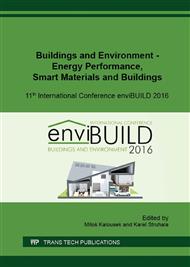p.519
p.527
p.537
p.547
p.556
p.564
p.577
p.585
p.593
Building Monitoring and Diagnostics: A Web-Based Approach
Abstract:
Efforts toward optimized building management and operation require monitoring data from multiple sources. Experiences from previous research projects underline the need for an easily adaptable, low-cost, and easy to set up monitoring infrastructure that could provide data for modeling and performance evaluation. The increasing availability of small and powerful development boards (e.g. Raspberry Pi BeagleBoard or Arduino) facilitates the implementation of a cost-efficient infrastructure for data collection and building monitoring. For the purpose of the present contribution, the Arduino Yún was used to create a data logger that obtains data from wireless sensors, stores it locally, and syncs it with a data repository. Toward this end, we have developed a web-based user interface that enables the user to evaluate various aspects of the monitored building's performance. The communication between the software components is implemented via RESTful interfaces and enables the user to integrate also other data sources such as web services. The paper includes an actual implementation of the above approach. Thereby, we illustrate how the constitutive system components can be integrated in terms of a versatile monitoring system with multiple utilities in terms of building performance assessment and building diagnostics.
Info:
Periodical:
Pages:
556-563
DOI:
Citation:
Online since:
December 2016
Authors:
Price:
Сopyright:
© 2017 Trans Tech Publications Ltd. All Rights Reserved
Share:
Citation:


